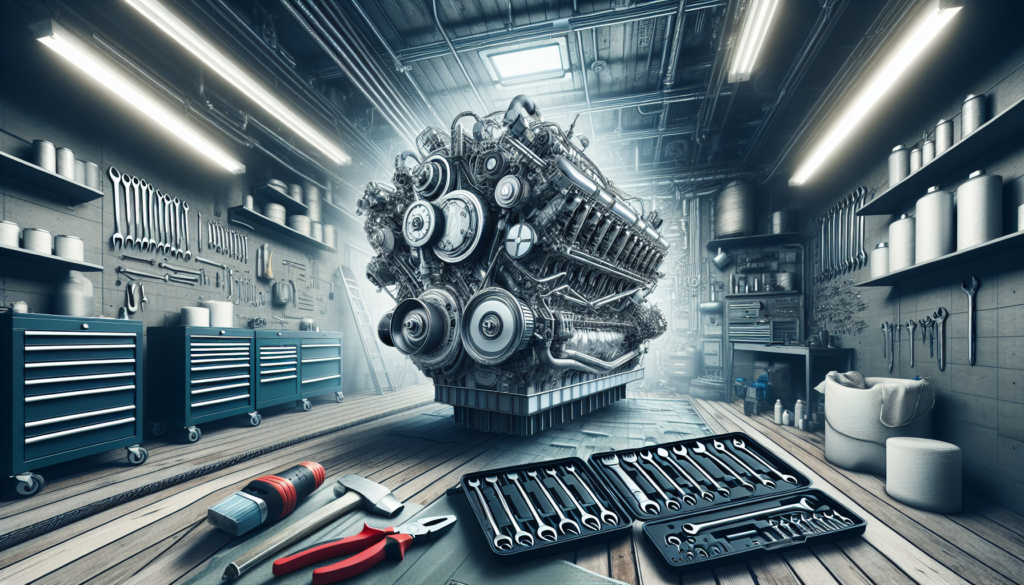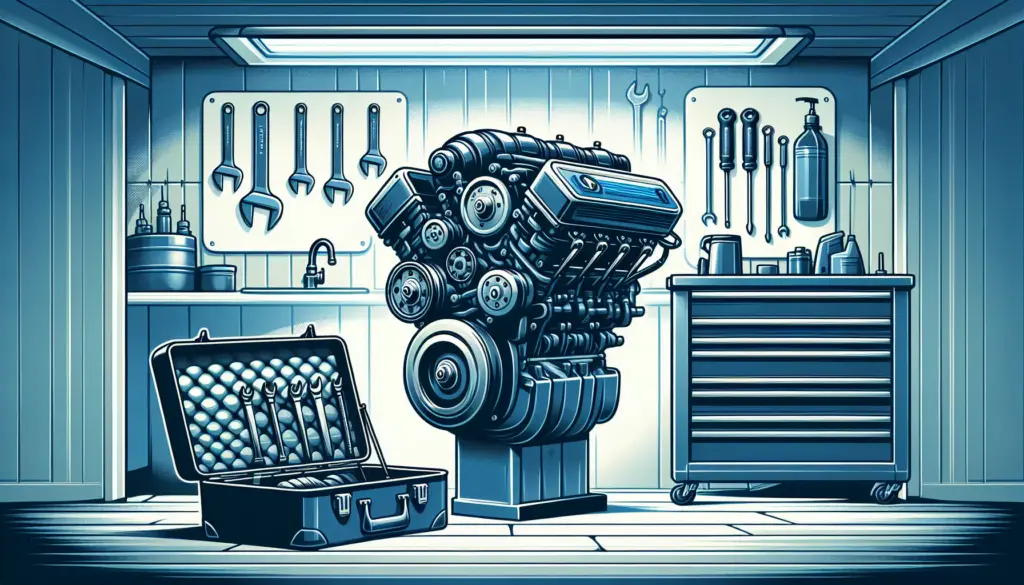Imagine the breeze in your hair and the sun on your face as you skim across the water in your boat. Only thing that could ruin this perfect moment? A faulty boat engine. This is why your boat engine’s performance is crucial for every successful boating experience. This compelling article will offer you a comprehensive guide on how to maintain your boat engine’s longevity and efficiency. So, instead of worrying about your engine failing in the middle of the lake, you’ll be able to sit back, relax, and soak up your time on the water.

Understand Your Boat Engine
Having a boat engine operating efficiently is vital to not only get you from one place to another but also avoid unnecessary issues and expenses. The first step in this process is understanding your boat engine.
Know the type of engine
Boat engines come in two main types: inboard motors and outboard motors, with variations within them. Determine the type of engine that’s on your boat. This not only aids in understanding its workings better but is also useful when purchasing replacement parts or explaining issues to a mechanic.
Familiarize yourself with the parts
Get acquainted with your boat engine’s main components and their functions. This will include the carburetor that mixes air and fuel, spark plugs which ignite the mix, the impeller which pumps the water for cooling, and so on. Understanding what happens under the bonnet will make maintaining, troubleshooting, and communicating about your engine easier.
Learn basic engine functioning
Just like a car engine, a boat engine follows a simple principle: it burns fuel to create a force that propels your vessel. This happens through a series of events known as the four-stroke cycle: intake, compression, combustion, and exhaust. The better you grasp these concepts, the better equipped you’ll be to keep your boat engine running smoothly.
Understanding the manual
Your boat engine manual is your go-to guide for its service requirements, troubleshooting recommendations, and accommodations specific to its make and model. Make sure to read, understand, and follow the provided guidelines for optimal performance of the engine.
Regular Maintenance
The key to a healthy, long-lasting boat engine is regular maintenance. This ensures all parts are working as they should, helping to prevent major problems.
The Importance of regular check-ups
Regular check-ups are essential to keep your boat engine running at peak efficiency. They can help you spot potential problems early and prevent costly breakdowns.
Schedule for different maintenance tasks
Different tasks need to be done at different intervals. Some tasks, like checking the oil and coolant levels, should be done every time you use your boat. Others, like changing the oil or spark plugs, are required seasonally or after a certain number of hours of operation.
Professional maintenance versus DIY
While many maintenance tasks can be done by yourself, others might require professional help. Routine tasks such as oil change and filter replacements can be easily carried out by you. However, for more complex tasks requiring special tools or skills, it’s best to leave it to the experts.
Keeping a maintenance record
Keeping a record of all maintenance carried out on your boat engine can help you stay on top of necessary tasks. It also provides valuable documentation about the care and upkeep of your engine, which can be useful when selling your boat.
Keep the Engine Clean
Cleanliness is important to your boat engine’s performance and lifespan. An engine free from dirt, grime, and corrosion will run smoother and last longer.
Importance of a clean engine
A clean engine can work more efficiently because it can dissipate heat more effectively. It’s also easier to spot potential problems on a clean engine, such as oil leaks or corroded parts.
Techniques for cleaning the engine
Use a damp cloth to wipe the engine and a soft brush for those hard-to-reach areas. A vacuum with a small attachment can be used to get rid of dry dust and debris.
Products to use for engine cleaning
Use marine-grade cleaners for tough grime and grease. Remember to avoid using harsh chemicals that can damage sensitive engine parts. Always follow the cleaner manufacturer’s instructions for best results.
How often should the engine be cleaned
While there’s no strict timeline, most experts recommend cleaning your boat engine every 100 hours of operation or at least once every season.
Proper Lubrication
Lubrication is crucial for the smooth running of your boat engine. It reduces friction between moving parts and prevents wear and tear.
Why lubrication is crucial
Without proper lubrication, parts can grind against each other, leading to overheating, increased wear, and, ultimately, engine failure. Regular oil changes are crucial to providing a constant supply of clean, fresh lubrication.
Choosing the right lubricant
Always choose a lubricant that’s specifically formulated for marine engines. Boat engines operate in tough environments and require specialized oils capable of withstanding high pressures and resisting water contamination.
How to properly lubricate your engine
Refer to your engine manual for the correct method to lubricate your engine. Always ensure to fill to the correct level and not to overfill.
Signs of insufficient lubrication
Common signs of insufficient lubrication include an overheating engine, increased noise, decreased performance, or unexpected breakdowns. If any of these occur, your engine may need oil.

Fuel Quality and Efficiency
Fuel quality directly affects the performance and the health of your boat engine.
Understanding fuel types
Boat engines use either gasoline or diesel fuel. The type of fuel your engine requires will depend on its design and manufacturer’s specifications. Always use the recommended fuel type.
How fuel quality affects the engine
Poor-quality fuel can leave deposits in your engine and fuel system, leading to decreased performance, poor fuel economy, and possibly even engine damage.
Ensuring efficient fuel consumption
Maintain your engine regularly and ensure it’s properly tuned. Follow the manufacturer’s guidelines for the best type and grade of fuel to use.
Dealing with fuel-related issues
If your engine is running rough or lacking power, it might be due to poor-quality fuel. Consider using a fuel stabilizer or cleaner to help remove deposits and improve the quality of your fuel.
Proper Winterizing
Proper winterizing keeps your boat engine safer, efficient, and ready for operation when spring comes.
What is winterizing
Winterizing is the process of preparing your boat and its engine for downtime during the colder months. It protects the engine from damage due to freezing temperatures.
Why it’s important for efficiency
Appropriate winterization prevents damage that could lead to costly repairs and reduced efficiency. Water left in the engine can freeze and expand, causing severe damage.
Steps to properly winterize your boat engine
To winterize, you’ll need to fog the engine, stabilize the fuel, change the oil, and add antifreeze to the cooling system, among other tasks. Each engine may have a slightly different process, so it’s important to follow your owner’s manual.
Common winterizing mistakes
Some common mistakes include neglecting to change oil and filters during winterization or failing to properly protect the fuel system. Each can lead to their own set of problems when it’s time to start up the engine again.
Avoid Overloading
The efficiency and lifespan of your boat engine can be affected if you overload your boat.
How overloading affects the engine’s performance
Overloading places undue pressure on the boat’s engine, leading to increased wear and tear, hence reducing the engine’s lifespan. It can also affect stability, speed, and maneuvering.
Determining your boat’s capacity
Your boat’s capacity is typically indicated on the capacity plate installed by the manufacturer. This information can also be found in the owner’s manual. Never exceed the recommended maximum weight.
Tips to avoid overloading
To avoid overloading, distribute weight evenly throughout the boat. Keep track of the weight of gear and equipment, and remember that the weight of fuel and water needs to be factored into the total load.
Deal With Any Repairs Promptly
Dealing with engine repairs promptly can protect your engine from further damage and prevent a minor issue from becoming a major problem.
Identifying potential engine problems
Become familiar with common engine problems. For example, if your engine won’t start, lacks power, misfires, overheats, or produces smoke, these could be signs that something is wrong.
Performing routine inspections
Regularly inspect your engine for signs of wear and tear. Look for loose or frayed belts, corrosion, leaks, or any other visible signs that could indicate potential problems.
Why prompt repairs are important
Addressing engine problems promptly saves you time and money in the long run. Small issues, if ignored, can turn into more expensive repairs down the line.
Finding a reliable mechanic
Ensure that whoever works on your engine is a reliable and qualified marine mechanic. They should be familiar with your specific make and model of boat engine and have the necessary tools and expertise to perform the required repairs.
Water Cooling System Maintenance
Maintenance of the water cooling system is vital for the health and longevity of your boat engine.
Understanding the water cooling system
A boat’s engine is cooled by a system that draws in surrounding water, circulates it around the engine block, then pumps it out. This constant flow of water prevents your engine from overheating.
Proper maintenance of the cooling system
Do regular checks of the cooling system to ensure it’s functioning correctly. This includes checking the water pump, hoses, and thermostat. Cleaning of the raw water strainer and replacing the impeller as per manufacturer’s guidelines is also important.
Symptoms of a failing cooling system
Watch out for signs of a failing cooling system, like overheating, low coolant levels, or coolant leaks. If these signs are ignored, it could lead to costly engine damage.
Emergency procedures for cooling system failure
If you suspect the cooling system has failed while you’re on the water, shut down the engine immediately to prevent damage. Do not attempt to fix the problem while the engine is hot; wait until it has cooled down.
Upgrade and Update When Necessary
Upgrades and updates can help your boat engine keep up with its hardware requirements and stay efficient for longer.
Benefits of engine upgrades
Engine upgrades can lead to better performance, enhanced fuel efficiency, and increased reliability. They can also extend the life of your engine.
Knowing when to upgrade
When your engine begins to show signs of decreased performance or frequent breakdowns, it might be time to consider an upgrade. Consult with a trusted marine mechanic to get their opinion and discuss potential upgrade options.
How to perform an engine upgrade
Performing an engine upgrade requires knowledge, tools, and parts. Some upgrades can be done yourself, but others may require professional help. Always follow the manufacturer’s guidelines when performing any engine upgrades.
Finding reliable parts and services
Always invest in high-quality, reliable parts for any upgrades. And rely on knowledgeable, reputable professionals for installation of these parts. This ensures your boat engine receives the care and performance enhancements it deserves.
Taking care of your boat’s engine isn’t as intimidating as it seems. With a little time, patience, and consistent maintenance, you can ensure that your engine stays reliable and efficient for many boating seasons to come. Enjoy your time on the water knowing you’ve done your part to keep your engine running smoothly – and remember, when in doubt, always consult a professional.


[…] Boat Engine Maintenance kicks off with evaluating the oil’s condition. […]
[…] the common falsehoods surrounding boat engine care. Don’t let the myths fool you – to keep your boat engine running smoothly and prolong its lifespan, you’ll want to dodge these misconceptions like a seasoned sailor […]